To get quick responses for a credit reference request, start with a clear and concise subject line. Use a professional greeting and state your request directly at the beginning. Include specific details about the credit reference needed, like payment history or credit limits. Closing with a polite thank you and a deadline for response encourages timely action. Make sure your contact information is easy to find for follow-up. Avoid jargon and keep your email brief. By crafting your request this way, you're likely to see faster replies and a more successful outcome. Stay tuned for tips on further optimizing your approach!
Key Takeaways
- Use a clear subject line under 50 characters to enhance visibility and prompt attention.
- State your credit reference request upfront, specifying details such as payment history and credit limits.
- Include a specific deadline for the response to encourage prompt feedback.
- Maintain a professional tone throughout, expressing appreciation for the recipient's time and assistance.
- Follow up politely one week later if no response is received to reinforce the importance of your request.
Introduction
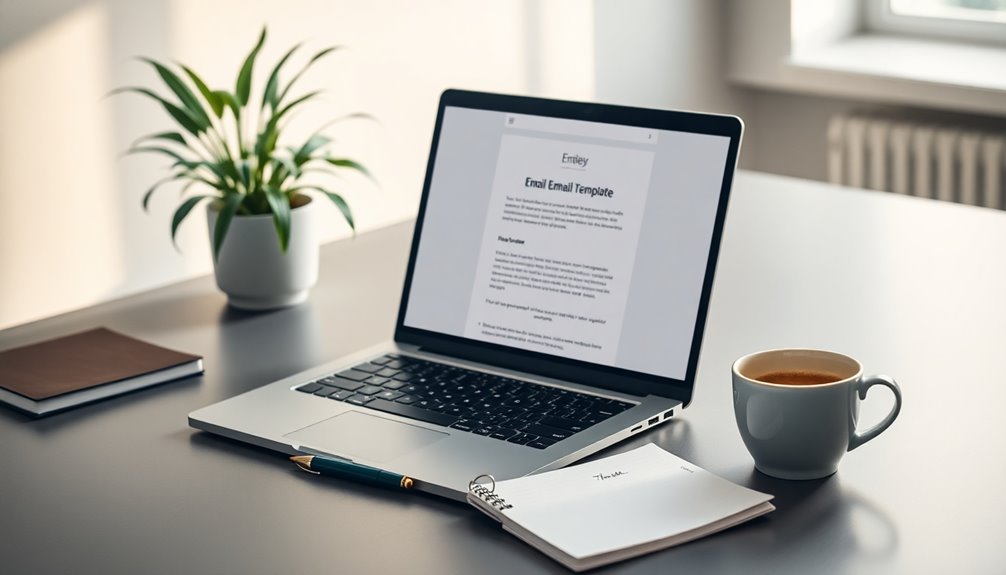
When you need a credit reference, crafting a clear and professional email can make all the difference. A well-structured Credit Reference Request not only conveys your needs but also shows respect for the recipient's time.
Start by writing a subject line that clearly indicates the purpose of your email. This helps the recipient quickly grasp the importance of your request.
Begin your Reference Request Email with a professional greeting to set a respectful tone. It's essential to build rapport right from the start.
In the body, provide detailed information about your request. Include specific data points you need, such as payment history and credit limits, to ensure clarity and eliminate any confusion.
Ensures Timely Credit Evaluations

Timely credit evaluations are essential for making informed business decisions, especially when extending credit. When you send a well-crafted request for a professional reference, you set the stage for quicker responses. A structured email template can streamline this process, ensuring that your referees understand exactly what you need and when you need it.
To enhance efficiency, always provide clear deadlines in your request. This helps referees prioritize your inquiry, making it easier for them to respond promptly. Remember, accuracy and speed are key; a well-timed credit reference can significantly reduce processing times for loans and credit lines.
Don't forget to follow up within a week if you haven't received a response. This gentle nudge can increase your chances of getting timely feedback, ultimately expediting the credit evaluation process.
With these strategies in place, you can ensure that your credit assessments are completed efficiently, allowing you to manage financial risks effectively. By prioritizing timely evaluations, you position your business for better decision-making and improved financial management.
Clear Subject Line

A clear subject line is crucial for grabbing your recipient's attention right away. Your request email should include a succinct and direct subject line that conveys its purpose.
For example, you might use "Request for Credit Reference – [Your Company Name]." This not only states your intention but also personalizes the email if you include the recipient's name, increasing the likelihood they'll open it.
Keep your subject line under 50 characters to ensure it's fully visible in most email clients. Avoid vague terms that could lead to confusion or delays.
Instead, opt for action-oriented language like "Urgent Request" or "Immediate Assistance Needed," which can prompt quicker responses.
Step-by-Step Guide to Crafting Requests
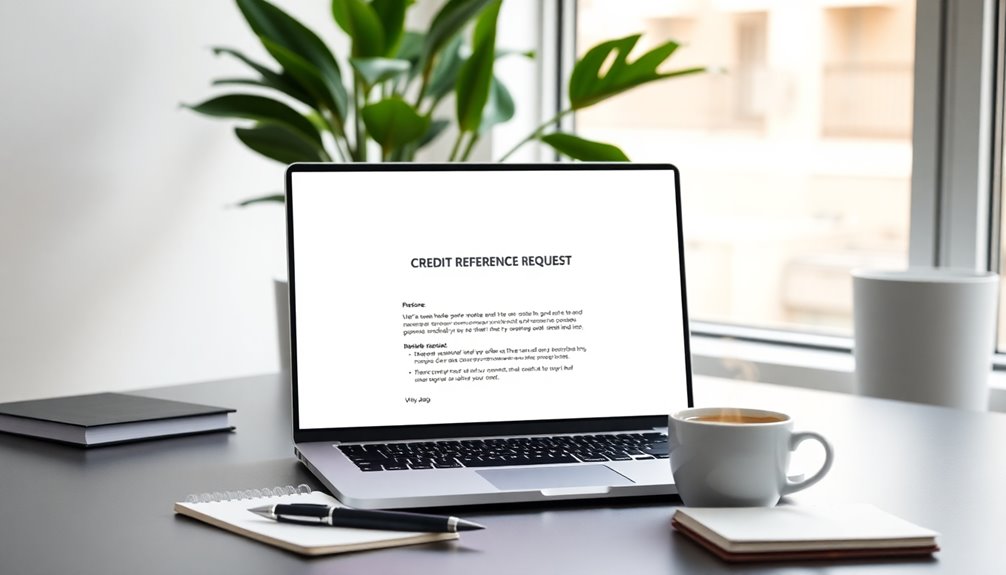
Crafting a credit reference request requires a structured approach to ensure you get the information you need. Start with a clear and concise subject line, like "Request for Credit Reference for Business Evaluation." This immediately conveys your message's purpose.
Next, use a professional greeting. Address the recipient by name if possible, as this helps establish respect and sets a positive tone.
In the body of your email, provide specific details about the reference you need—like payment history and credit limits. This clarity facilitates a quick and accurate response.
Include a clear call to action, encouraging the recipient to respond promptly. You might say, "I'd appreciate your response by [specific date]." This can help expedite the process and keep things moving forward.
Lastly, conclude with a polite closing that expresses gratitude in advance for their assistance. This fosters goodwill and encourages a quicker reply.
Pro Tips for Maximizing Impact
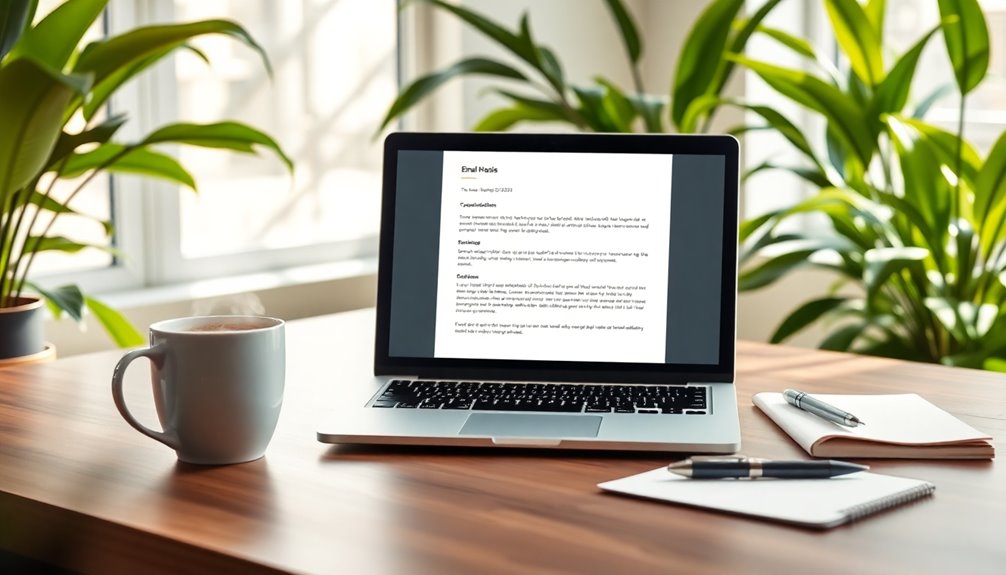
When you send a credit reference request, it's crucial to make a strong impression from the start. Use a clear and concise subject line, like "Request for Credit Reference – [Your Company Name]," to immediately communicate your email's purpose.
Begin with a professional greeting and express gratitude for the recipient's time. This sets a positive tone and encourages a prompt response.
Clearly outline the specific information you need, such as payment history details and outstanding balances. This prevents ambiguity and helps the recipient understand exactly what you're looking for.
Keep the body of your email concise while ensuring you address all essential points. Brevity maintains the recipient's attention and increases the likelihood of a swift reply.
Conclude with a polite closing statement that reinforces your appreciation. Include your contact information, making it easier for them to reach out with the requested additional information.
Utilizing effective business email templates can also streamline your process, ensuring your requests are both professional and impactful. By following these tips, you'll maximize your chances of receiving quick responses to your credit reference requests.
Common Mistakes to Avoid

One major mistake to avoid in your credit reference request emails is failing to include essential details, as this can lead to confusion and delays. Clearly state the purpose of your request and specify the information you need. This helps recipients understand what you're asking for and respond more quickly.
Using an unprofessional tone or language can also deter recipients from taking your request seriously. Keep your email polite and respectful to encourage prompt responses.
Additionally, ignoring proper formatting and structure makes your email hard to read. Use paragraphs and bullet points to highlight key points, ensuring important information stands out.
Don't forget to follow up within a reasonable timeframe. If you wait too long, recipients might forget about your initial request, resulting in missed opportunities.
Lastly, avoid overloading your email with excessive information or unnecessary details. Keeping your message concise and focused increases the likelihood of a quick response.
Reference Request Email Sample
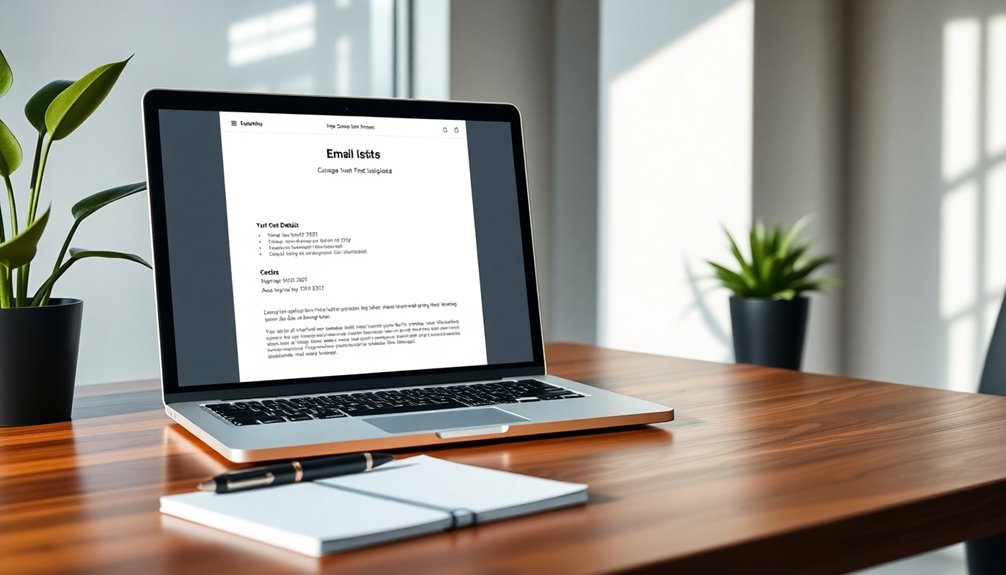
To effectively request a credit reference, start by clearly stating your purpose in the subject line and opening sentence. For example, you might write, "Request for Credit Reference for ABC Corp."
In the email body, specify the information you need, like payment history and credit limits. This clarity helps the recipient understand your request's importance for accurate evaluations.
Maintain a professional tone throughout to establish credibility. You could say, "Dear [Recipient’s Name], I hope this message finds you well. I'm reaching out to request a credit reference for ABC Corp. My job title is [Your Job Title], and we're in the process of evaluating their creditworthiness."
This approach shows you're serious about the request.
Don't forget to express gratitude in your closing. A simple, "Thank you for your assistance with this matter. I appreciate your help!" can go a long way in fostering a positive relationship.
If you haven't received a response within a week, follow up politely. This demonstrates persistence and respect for their time, which may lead to quicker replies.
Final Thoughts
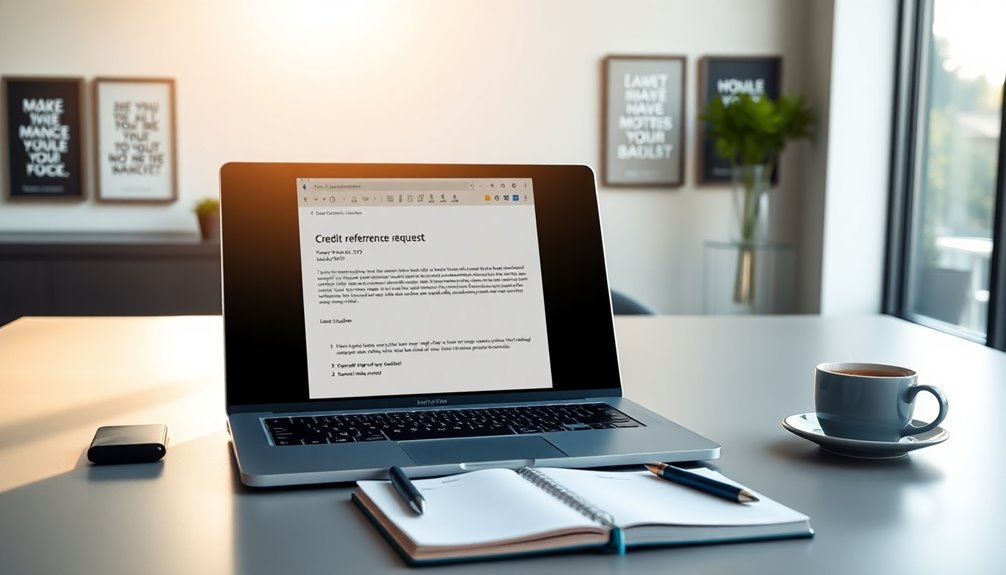
Crafting a credit reference request email can significantly impact your ability to gather necessary information quickly. By ensuring your email is tailored to your specific needs, you increase the chances of receiving a prompt response.
A well-structured email clearly outlines the purpose and the information you require, helping the recipient understand your request without confusion.
Using a professional tone and concise language can enhance engagement, making the recipient more willing to respond quickly. Don't forget to include a clear call to action, such as a specific deadline for the information; this creates urgency and encourages a faster reply.
Additionally, expressing gratitude in advance fosters goodwill and encourages a positive response.
If you don't receive a reply within a week, a polite follow-up can reinforce the importance of your request and maintain open communication.
Remember, the key to a successful credit reference request email lies in clarity and professionalism. Keep your message focused, and don't hesitate to ask for anything else you need to ensure a smooth process.
Frequently Asked Questions
How to Write an Email for a Reference Request?
When you write a reference request email, start with a clear subject line, use a professional greeting, outline specific information you need, emphasize its importance, and thank the recipient for their assistance.
How Do You Write a Credit Email?
To write a credit email, start with a clear subject line, address the recipient professionally, state your request concisely, outline required information, maintain a polite tone, and close with gratitude and your contact details.
How to Respond to Reference Request Email Sample?
When responding to a reference request email, thank the requester, confirm your willingness to help, highlight the candidate's skills, and offer to provide more information if needed. Keep it positive and supportive throughout.
How to Request a Credit Reference?
To request a credit reference, clearly identify yourself and the purpose. Specify needed details like payment history. Maintain a professional tone, and follow up if you don't receive a response within a week.









